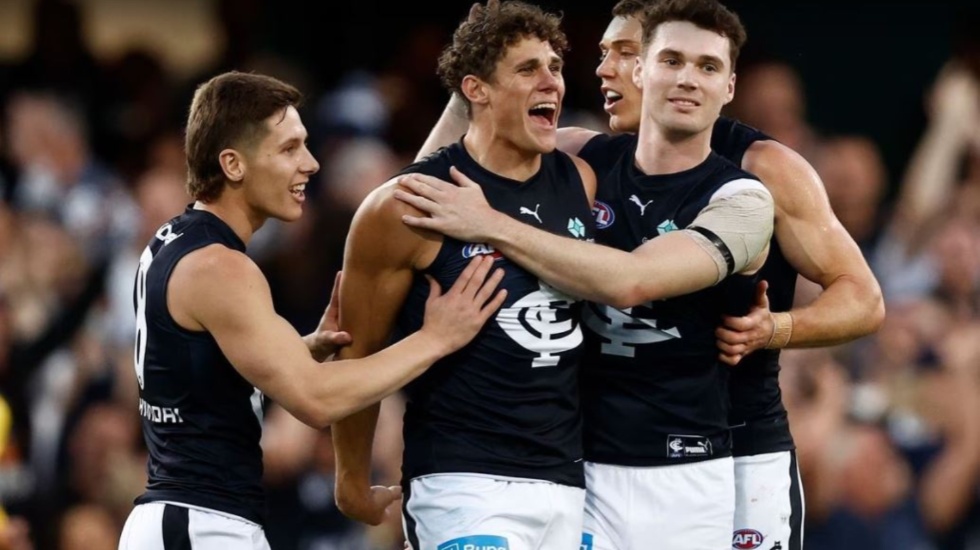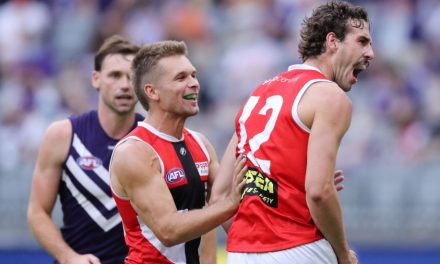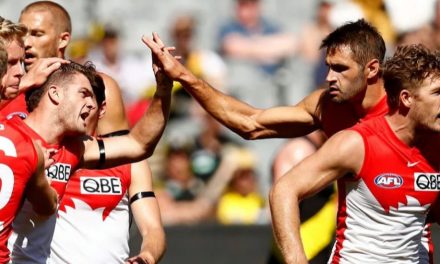The Blues were up and about after this Charlie Curnow goal early in the preliminary final against Brisbane. Photo: AFL MEDIA
There’s the disappointment that goes hand-in-hand with missing out on a grand final berth. Then there’s the perspective which comes with time for reflection.
Carlton will right now be feeling plenty of the former after its loss to Brisbane, particularly having led the Lions by as much as five goals at the most intimidating away venue in the AFL.
But even the harshest critic of the Blues, let alone anyone involved with Carlton, couldn’t possibly see the bottom line for 2023 as anything but the biggest of ticks, for the simple reason that this was as remarkable a transformation of a team over a short period as modern football has seen.
It’s been noted a lot lately, but really is worth pointing out again, that as late as Round 15 of the home and away season, Carlton was 15th on the AFL ladder, officially a bottom four team, with talk of boardroom coups and the potential sacking of coach Michael Voss becoming almost a daily occurrence.
From there to just on three goals short of a grand final berth is an incredible turnaround indeed – 11 wins from 13 games in the end – and every bit as significantly as the 2023 result, the building blocks the reversal has put in place for next season, and the several after that, given Carlton goes into next year with (currently) just one player older than 30.
Even when things on the field were at their worst this season, the Blues’ top brass refused to succumb to the white noise coming from outside the club, buoyed by the fact that many of the fundamentals were sound and that not a lot needed to be tweaked for significantly better results, a belief that was realised in stunning fashion.
Even in defeat against Brisbane at the Gabba, those elements which were always there remained present again. And there was enough of a glimpse of those elements which have improved to have Carlton’s supporter base already looking forward expectantly to next year.
The Blues in their revival played few if any quarters as exhilarating as their opening term at the Gabba on Saturday evening.
Their pressure was relentless, forcing usually assured Lions’ ball users into repeated fumbles and error. They dominated the centre bounce clearances 5-1, and against the team with the best inside 50 differential in the competition, dominated the inside 50s 22-11 come quarter time.
Their ball movement was zippy, direct and surer than Brisbane’s. Sam Walsh and Blake Acres were prolific and damaging with every touch. And key forward targets Charlie Curnow and Harry McKay loomed dangerously, each kicking an early goal.
Indeed, had it not been for Brisbane key defender Harris Andrews, who seemed to be holding back a Carlton tide almost on his own, the Blues might have just about put the result to bed. It was only when Brisbane finally knuckled down and took hold of the stoppages that the tide turned. And it did so dramatically.
PLEASE HELP US CONTINUE TO THRIVE BY BECOMING AN OFFICIAL FOOTYOLOGY PATRON. JUST CLICK THIS LINK.
Over the next two-and-a-bit quarters, the Lions racked up 39 forward entries to just 18, and kicked 10 of 11 goals scored. A Brisbane victory seemed inevitable a long way from siren time. And yet it was only when Lincoln McCarthy booted the Lions’ last goal of the game with just under three minutes remaining, that the door was completely slammed shut on the Blues.
Which is another testament to their resilience, a factor which really has been the prevailing theme of their entire finals series, especially in those earlier wins over Sydney and Melbourne, who both looked set at stages to roll right over the top of the Blues.
And that was typical. Aside from one smashing against Adelaide early in the season, Carlton didn’t lose a single game by anything much more than five goals. It ranked top four in three of four defensive statistical categories. Midfield it ranked top six in five of six categories, and No.1 for both contested possession and groundball differentials.
In terms of personnel in 2023, it proved a season where Carlton learned to reduce its traditional dependence upon the biggest few names like Cripps, Walsh, Curnow and Weitering.
Again, the preliminary final was instructive, with a clearly hampered Cripps having a very quiet game by his standards with only 13 disposals. Coleman Medal winner Curnow, meanwhile, had his third quiet final in a row, again held to just one goal.
Yet the Blues were able still to conjure finals-winning tallies without much input from Charlie. Around the ball, too, the consistent contributions of the likes of George Hewett and Blake Acres made a big difference.
The pressure of small forwards such as Jesse Motlop and Lachie Fogarty made the Blues more potent, role players like Matt Cottrell and Alex Cincotta did jobs which quite visibly made Carlton stronger overall, and the promise of Tom De Koning and Ollie Hollands became more obvious by the week.
Too often over the years, the Blues have had one part of the collective promise plenty but the overall capacity of that collective still short of the mark because of weaknesses elsewhere. That’s much less the case now.
And the extent of the roll on which Carlton got the longer this season went proved that there was never all that much required for a massive difference to the bottom line in 2023 for the Blues.
Voss said after the game on Saturday night he hoped the wrench of being just three goals shy of a grand final berth turned Carlton into a “hungry football team” which “wants to figure at this end of the season more often”.
But he was also realistic enough to concede that if anyone at Ikon Park around late June had been offered third spot on the AFL ladder at the end of the season, they’d have taken it in a heartbeat.
Fact is, Carlton’s 2023 really was one of the great revival stories. And while the Blues lost on Saturday night, that in itself remains a massive win for the immediate future.
This article first appeared at ESPN.










